
An Affair to Remember: Harold Pinter’s Betrayal in Wellfleet
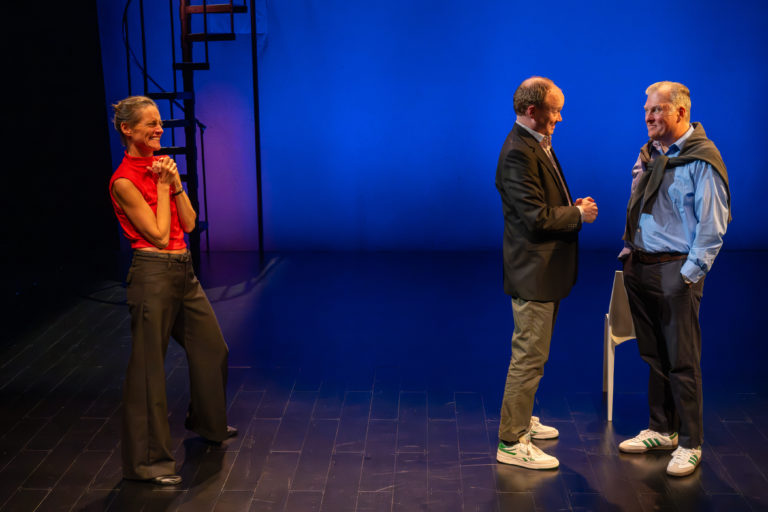
One of the most powerful aspects of Harold Pinter’s work is in the spaces he creates between the lines spoken by his characters. It’s in the silences, in the pauses, that the more visceral story is being told, and in no other work is this more apparent than in Betrayal, now playing at the Wellfleet Harbor Actors Theater as an inaugural co-production between WHAT and the Harbor Stage Company. And director Robert Kropf makes those silences, those gaps, those moments of suspension work dramatically.
Which is not to say that the dialogue doesn’t convey enough in itself.
Betrayal is an autobiographical drama, the revelation of an extramarital affair told in reverse chronological order, allowing the audience’s sympathy to shift in interesting ways and showing how meaning can change over time. The story opens with Emma (Brenda Withers) and Jerry (Jonathan Fielding) meeting in a pub two years after their seven-year affair has burnt itself out. They both have families and careers: Emma runs an art gallery, and Jerry is a literary agent whose wife knows nothing about his long extramarital relationship; Emma’s husband—and Jerry’s best friend—Robert (William Zielinski) is a successful publisher. The three have been enmeshed in each other’s lives for over a decade, and throughout the nine scenes, they attempt indifference to the fundamental questions around their relationships while clearly feeling them passionately; it takes immense skill to convey that kind of emotion through Pinter’s stark and sometimes stilted dialogue, and all three actors pull that off with grace and energy.
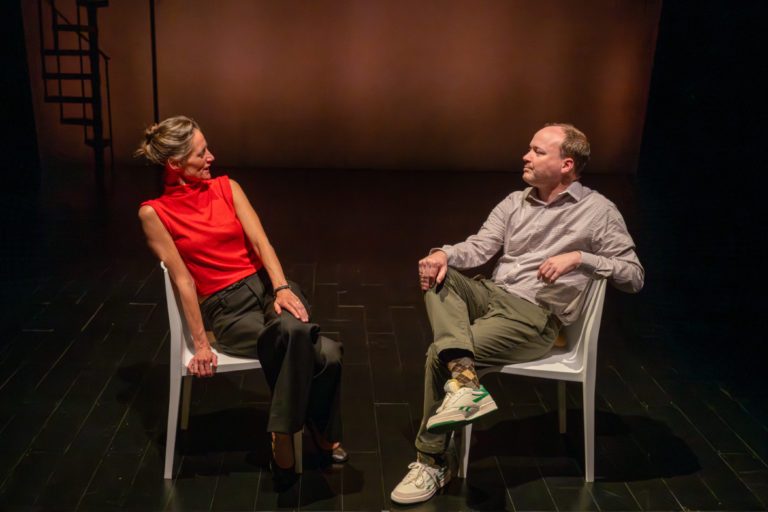
Dorothy L. Sayers has written about an unspoken rule decreeing that all affairs must end in pointless conversations, and this is no exception: when Emma and Jerry meet, the inevitable question, “how are you?” is answered by a helpless, “what does it matter?”
There’s an image they all share and talk about: at one time, in one kitchen or another, Jerry tossed Robert and Emma’s young daughter Charlotte into the air and caught her again. It’s a thread that weaves itself through time and memory, illustrating how the past is never static and how remembrances are often flawed.
It’s not just memory that weaves itself through the years and the conversations, but also the question of honesty. It’s only after his reunion with Emma that a frantic Jerry learns for the first time that Robert had known about their liaison for some time (later, Pinter will bring the audience back to that crucial revelation). Robert has never spoken of it to Jerry, and that withholding of a crucial truth seems more destructive than the event itself.
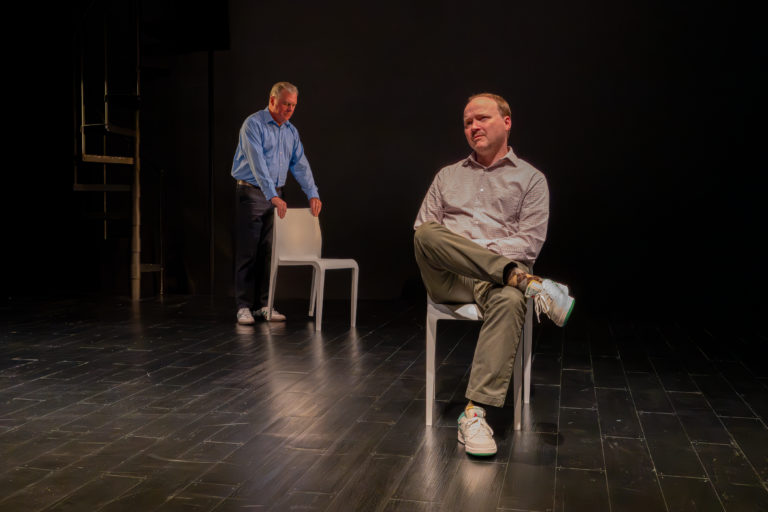
It is such a pleasure to see Fielding onstage again. His Jerry is nuanced and reveals unexpected turns; his chief concern is protecting his friendship with Robert rather than his liaison with Emma. Emma remembers everything about the lovers; Jerry remembers Robert reading Yeats in Italy. Fielding is in a palpable panic when he learns that Robert has been told of the affair and his ambiguity about Emma herself is compelling.
Withers brings an appropriate nervous energy to Emma, who is perhaps the most shallow of the trio; she clearly needs to be desired and takes that desire as her due. She began the affair with Jerry on a drunken New Year’s Eve; two years after its ending, she appears to be in another affair with a writer represented by Jerry. It would be easy to dismiss her shallowness and even find her repelling, but Withers’ talent is in suggesting feelings below the surface that she is at pains to not reveal.
And Zielinski is masterful at revealing the complexities of the character based upon Pinter himself; Robert could easily be just an abusive, wealthy, uncaring husband; but in his words and in his pauses, Zielinski shows his years-long disassociation from Emma as a self-protective act, burying feelings and pain and need.
Kropf and lighting designer John Malinowski made some interesting decisions, including starting and ending the play with the house lights up; they dim after several minutes and come back on gradually, but the effect is to ease the audience into and out of the story, paradoxically making it seem more rather than less real. Christopher Ostrom’s staging is pitch-perfect and spare—two chairs along with a corkscrew staircase that utilizes the height of the Julie Harris stage—which makes the drama inescapable.
In the end, it’s impossible to say with certainty who has been betrayed, and by whom. An open question that will make for many post-performance conversations.
And despite it all, there are moments of humor. Ari Lew’s Italian waiter adds comic relief, and Robert’s assertion while on holiday in Venice that people there converse “in their laughing, Mediterranean way” is both amusing and revelatory. Carol Sherry’s costumes are wonderfully forgettable—perfect for the play.
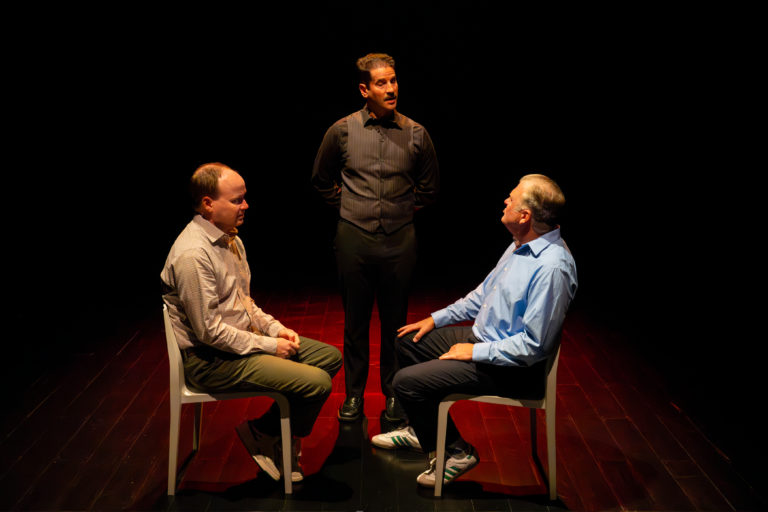
This collaboration between Wellfleet’s two theatre companies is long overdue and very welcome. Their production of Betrayal is unsettling and brutal… but also, thanks to deft direction and acting, poignant and beautiful and thought-provoking.
Pinter would be pleased.
Images: Michael & Suz Karchmer
Betrayal
A co-production of Wellfleet Harbor Actors Theater and Harbor Stage Company
September 22 – October 14, 2023 | Previews September 20 and 21
All performances at 7:00 PM. Running Time: approximately 80 minutes. Betrayal is performed without an intermission.
More Recent Provincetown News

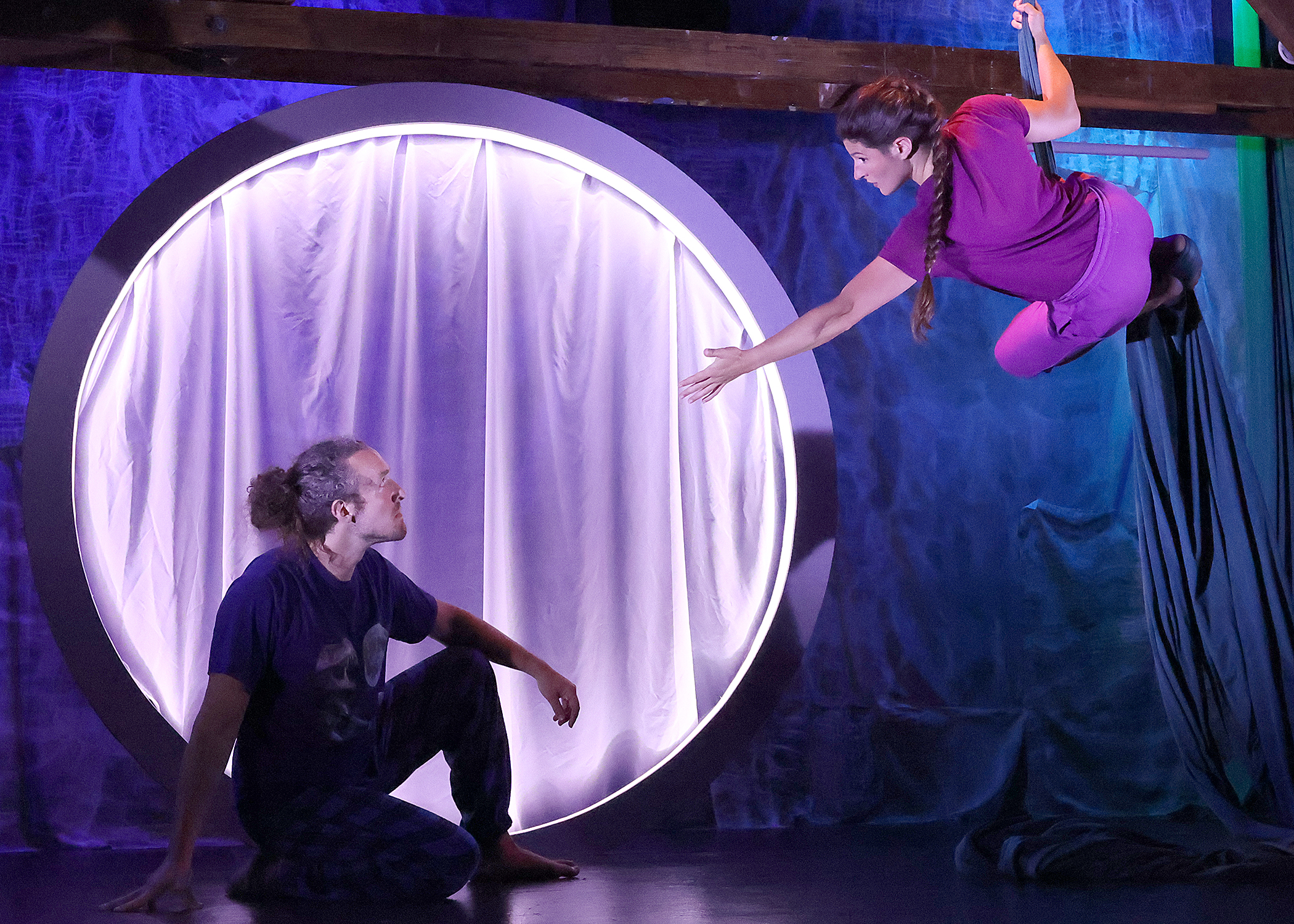


 Accommodations
Accommodations  Art
Art  Bars
Bars  Books
Books  Entertainment
Entertainment  Events
Events  Featured
Featured  Guides
Guides  History
History  Literary stuff
Literary stuff  Most Popular
Most Popular  Provincetown News
Provincetown News  Restaurants
Restaurants  Reviews
Reviews  Shopping
Shopping  Theatre
Theatre  Uncategorized
Uncategorized  Weed
Weed